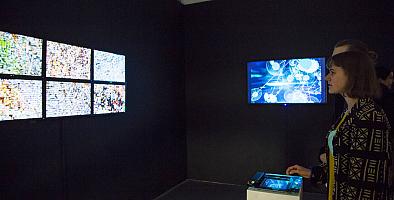MPhil/PhD
Anthropology
Content navigation menu
Why study MPhil/PhD Anthropology at Goldsmiths
The Department of Anthropology offers supervision in a wide range of areas for research degrees.
-
In addition to the particular research interests of each member of staff, we have a number of postgraduate students undertaking research of contemporary social and political relevance in Britain and Europe.
-
Current students are engaged in research projects covering a broad range of subjects, located in Africa, Europe, Latin America, and the Middle East.
Contact the department
If you have specific questions about the degree, contact Dr Henrike Donner.
Length
3-4 years full-time or 4-6 years part-time
Fees
Home - full-time: £TBC
Home - part-time: £TBC
International - full-time: £19000
Department
How do I choose between the MRes and MPhil/PhD?
Normally research students register for the MRes in order to complete the requisite training to carry out a doctoral research project. You then transfer to MPhil status after completing your MRes dissertation in September (or in your second year if you are part-time).
However, if you already have a substantial background, it is possible to register directly for the full-time MPhil, provided the department and your future supervisor(s) agree.
MPhil-registered students audit the same research training modules as MRes students without assessment. They prepare material for their formal ‘upgrade’ viva to PhD status, which may allow them to upgrade to PhD status and fieldwork or other forms of data-collection in that year (not before May), but usually not before the end of that first year.
Whether you start registered as MRes or MPhil, upgrading to PhD status takes place at a later date.
You'll research
Your first year
In the induction week before the beginning of the academic term in September, Goldsmiths provides an Induction Programme for all new research postgraduates. You will be introduced to Goldsmiths-wide and departmental facilities and procedures, and attend sessions on what is involved in doing a research degree, as well presentations of current research across Goldsmiths and the Graduate School.
In the first year, you are registered as an MPhil student initially and will work on your own research project and your 'upgrade material' for the transfer to the PhD status in conversation with your supervisors. You will also be expected to take or audit taught courses in the department and across Goldsmiths, including sessions provided for research students by the Graduate School.
Training offered to all students on the MPhil/PhD includes:
- Research Design
- Doing Ethnography
- Visual Anthropology Training (MPhil/PhD Visual Anthropology only)
- Core Qualitative Research Methods
- Modelling Social Data I
You may also take other modules depending on your specific training needs – such as learning a language, or auditing an MA course – either in the department or elsewhere, of particular relevance to your research project. You are encouraged to attend seminars in other parts of the University of London, attend conferences, and go on outside modules such as those organised by SeNSS (South East Network of Social Science) or CHASE (Consortium for the Humanities and Arts South East England).
From the beginning of your programme you will receive regular supervision, and you will be expected to produce work to be discussed in supervision sessions. Your progress and any outstanding training requirements will be formally reviewed by the Graduate School annually in conversation with your supervision team.
Fieldwork, upgrade from MPhil to PhD, and writing up your thesis
Your fieldwork or other process of data collection will typically start sometime between the summer term of your first year and the start of your second year. This always requires ethical clearance in the course of the 'upgrade' process from MPhil to PhD before the research has started.
The upgrade is part of your PhD process and usually takes place in the first year of registration by means of 'viva' examination based on material related to your project that includes a literature review, a detailed discussion of your project, an extended ethics form and the oral exam conducted by an internally appointed panel of examiners. This formal assessment (also referred to as 'upgrade') sanctions your transfer from MPhil to PhD registration.
Assessment for your PhD will be via written thesis (80,000 to 100,000 words) and viva voce.
Fees and funding
Annual tuition fees
These are the PG fees for students starting their programme in the 2025/2026 academic year.
- Home - full-time: £TBC
- Home - part-time: £TBC
- International - full-time: £19000
If your fees are not listed here, please check our postgraduate fees guidance or contact the Fees Office, who can also advise you about how to pay your fees.
It’s not currently possible for international students to study part-time under a student visa. If you think you might be eligible to study part-time while being on another visa type, please contact our Admissions Team for more information.
If you are looking to pay your fees please see our guide to making a payment.
Funding opportunities
ESRC/SENSS Doctoral Studentships
Fully-funded ESRC studentships are available to research students via this Doctoral Training Partnership (DTP). Find out more about the ESRC/SENSS Doctoral Studentships.
Goldsmiths scholarships and studentships
Explore the Goldsmiths scholarships finder to find out what funding you may be eligible for.
Paying your fees
Find out about paying your tuition fees.
Additional costs
In addition to your tuition fees, you'll be responsible for any additional costs associated with your course, such as buying stationery and paying for photocopying. You can find out more about what you need to budget for on our study costs page.
There may also be specific additional costs associated with your programme. This can include things like paying for field trips or specialist materials for your assignments.
Entry requirements
Should you not hold an MA in Anthropology from a UK university it is likely that you need to register for the MRes Anthropology before you can move to the MPhil.
There is little difference between the taught Masters and the qualifying year, except that the qualifying year is not a qualification in itself and involves no dissertation. If you achieve the required standard, you can apply to register for the MRes or MPhil/PhD.
International qualifications
We accept a wide range of international qualifications. Find out more about the qualifications we accept from around the world.
If English isn’t your first language, you will need an IELTS score (or equivalent English language qualification) of 6.5 with a 6.5 in writing and no element lower than 6.0 to study this programme. If you need assistance with your English language, we offer a range of courses that can help prepare you for postgraduate study.
How to apply
You apply directly to Goldsmiths using our online application system.
Before submitting your application you'll need to have:
- Details of your education history, including the dates of all exams/assessments
- The email address of your referee who we can request a reference from, or alternatively an electronic copy of your academic reference
- Contact details of a second referee
- A personal statement – this can either be uploaded as a Word Document or PDF, or completed online
- Details of your research proposal (see below)
- If available, an electronic copy of your educational transcript (this is particularly important if you have studied outside of the UK, but isn’t mandatory)
You'll be able to save your progress at any point and return to your application by logging in using your username/email and password.
Before you apply for a research programme, we advise you to get in touch with the programme contact, listed above. It may also be possible to arrange an advisory meeting.
Before you start at Goldsmiths, the actual topic of your research has to be agreed with your proposed supervisor, who will be a member of staff active in your general field of research. The choice of topic may be influenced by the current research in the department or the requirements of an external funding body.
If you wish to study on a part-time basis, you should also indicate how many hours a week you intend to devote to research, whether this will be at evenings or weekends, and for how many hours each day.
Research proposals
Along with your application and academic reference, you should also upload a research proposal at the point of application. This should be in the form of a statement of the proposed area of research and should include:
- Delineation of the research topic
- Why it has been chosen
- A section on methodology
- A brief list of major secondary sources
How detailed a research proposal are we looking for on the application form?
Obviously what you put on the form and exactly what you end up researching may be rather different, but in order to judge whether or not to offer you a place, the department needs to know whether you have the broad outlines of a viable project. This means:
- A project that is both worthwhile and interesting, but not over-ambitious
- A project that can realistically be achieved within the confines of PhD on a full-time (four years typically) or part-time (six years maximum) basis
- We need to be sure that you have thought about it carefully and are fully committed to the research
- We need to be sure that you understand what is involved in doing a PhD
- Your research proposal should give us enough information to be able to interview you (if you are in the UK) or reach a decision as to whether to admit you if you are not based in the UK
When to apply
We accept applications from October for students wanting to start the following September.
We encourage you to complete your application as early as possible, even if you haven't finished your current programme of study. It's very common to be offered a place conditional on you achieving a particular qualification.
If you're applying for external funding from one of the Research Councils, make sure you submit your application by the deadline they've specified.
Selection process
Once we receive your application form, it is forwarded to the Postgraduate Convenor, who normally sets up a formal interview with two other members of staff with relevant expertise. You may wish to contact the convenor as well.
At the interview you will be asked about your academic background and to elaborate on your plans for research, and you can also ask questions.
Further guidance
Find out more about applying.
Current staff and postgraduate research ranges across the world and across many sub-fields of social anthropology.






